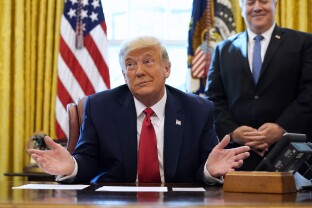As Donald Trump battles for his second term in the White House, he’s desperate to shake off lingering indictments alleging he committed crimes during his last stint in the Oval Office.
Trump’s attorneys have fashioned a tidy solution. Inciting an insurrection, mishandling classified documents, and interfering with an election don’t matter because, surely, the president is “immune” from prosecution for crimes committed while running the country even after he leaves office.
Right?
